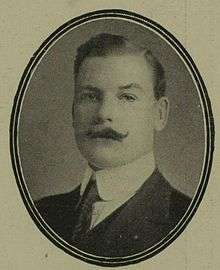Walter Waring (Liberal politician)
Walter Waring JP DL (1876 – 16 November 1930) was a British politician

The son of Charles Waring, Liberal Member of Parliament for Poole (1874, 1865-1868) and Eliza, daughter of Sir George Denys Bt., of Draycott, Yorkshire, Walter was educated at Eton College.
Military
He joined the 1st Life Guards in 1897, and served in the Second Boer War 1899-1900 (for which he was awarded the Queen's South Africa Medal and six clasps, and was mentioned in despatches). He was promoted to the rank of Captain in 1904. He served in the Yeomanry during World War I in France and Macedonia, 1915–1917, and in the Naval Intelligence Division during 1918 (and was awarded the Legion of Honour).
He was Master of the Horse to the Lord Lieutenant of Ireland in 1906–1907.
Political
Waring was unsuccessful Liberal candidate in Wigtonshire in 1906, and served as the Liberal MP for Banffshire from 1907–1918, and as Coalition Liberal for Blaydon from 1918–1922, and a National Liberal for Berwick and Haddington.
| Party | Candidate | Votes | % | ± | |
|---|---|---|---|---|---|
| National Liberal | Walter Waring | 6,342 | |||
| Labour | Robert Spence | 5,842 | |||
| Liberal | William Henderson Pringle | 4,422 | |||
| Independent Liberal | John Deans Hope | 3,300 | |||
| Majority | |||||
| Turnout | |||||
| National Liberal hold | Swing | ||||
from 1922–1923, when he lost the seat. He was the Municipal Reform (Conservative) member of London County Council for East Lewisham from 1925 to 1928. He later contested Wallsend as a Conservative in 1929.
He was Parliamentary Private Secretary to the Parliamentary Secretary to the Board of Agriculture and Fisheries in 1909-1910 and to the Secretary of State for War, 1919–1922.
Family
In 1901 he married Lady Clementine Hay CBE, only daughter of William Hay, 10th Marquess of Tweeddale. The couple had two daughters.
References
- The Times, 17 November 1922
External links
- Hansard 1803–2005: contributions in Parliament by Walter Waring
| Parliament of the United Kingdom | ||
|---|---|---|
| Preceded by Alexander William Black |
Member of Parliament for Banffshire 1907–1918 |
Succeeded by Charles Barrie |
| New constituency | Member of Parliament for Blaydon 1918–1922 |
Succeeded by William Whiteley |
| Preceded by John Hope |
Member of Parliament for Berwick and Haddington 1922–1923 |
Succeeded by Robert Spence |